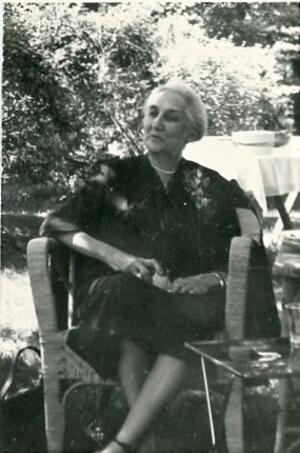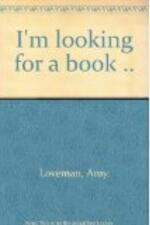Amy Loveman
Amy Loveman’s passion for literature made her the ideal book review editor and led to her vital role in the Book-of-the-Month Club, selecting great books to introduce to new readers. Born to a literary family, Loveman worked as an assistant to her uncles in editing The New International Encyclopedia and the New York Evening Post before helping found the Post’s Literary Review in 1920. In 1924, the Literary Review founders created an independent magazine, the Saturday Review of Literature, where Loveman served as associate editor, assigning books for review, writing and editing copy, and checking every detail of page proofs and layout. Starting in 1926, she also began working for the Book-of-the-Month Club, becoming head of the editorial department in 1938. For her work, Loveman was awarded the Columbia University Medal for Excellence and the Constance Lindsay Skinner Achievement Award of the Women’s National Book Association.
Amy Loveman, as described in the reminiscences of her friends, was optimistic without being foolish, incisive without being unkind, hardworking without being self-righteous, and the embodiment of unfailing integrity. As one of the founding editors of the Saturday Review of Literature and an important member of the Book-of-the-Month Club staff, Loveman applied those extraordinary personal qualities to her lifelong work of evaluating literature. Harry Scherman, the originator of Book-of-the-Month Club, once explained that she rarely read fewer than thirty books a month, and the books she read were placed in a context that was extraordinarily broad, balanced, realistic, and generous.
Education and Early Career
Loveman was born in New York City, on May 16, 1881, the daughter of Adolph P. and Adassa (Heilprin) Loveman. Amy Loveman’s maternal grandfather, Michael Heilprin, himself the son of a rabbi, was a noted encyclopedist, linguist, regular contributor to The Nation, outspoken foe of slavery, and supporter of Jewish immigrants to the United States. Adassa Heilprin apparently shared in her family’s tradition of learning and writing. Her brother-in-law Gustav Pollak notes in his biography Michael Heilprin and His Sons, “Girls and boys alike picked up languages very much as their father had done in his youth,” and wrote of Adassa that “in former years she wrote casually for the press.” Loveman’s father, who came to the United States from Hungary around 1850, was a cotton broker. He was also a lover of books and spoke six languages.
The eldest child in the Loveman family was a daughter who died in infancy; Amy was second, followed by three brothers, Herbert, Ernest, and Michael. The family was a primary source of Loveman’s education. She noted in Current Biography (1943) that “the family discussions of an intellectual nature” in which she had participated from childhood proved valuable later in life when she became a book reviewer.
She attended the Horace Mann School, graduating in 1897, and Barnard College, from which she graduated at age twenty, Phi Beta Kappa. (At Barnard, Loveman took no literature courses, convinced that her love of books would always inspire her to read and that her time in school should be devoted to other studies.)
Loveman’s first literary work was as assistant to her uncle Louis Heilprin, who was revising The New International Encyclopaedia and Lippincott’s Pronouncing Gazetteer of the World. Later, she worked at the New York Evening Post with another uncle, Gustav Pollak, helping prepare a special anniversary issue of The Nation. She was invited to remain at the Post as a book reviewer. In 1920, she helped to found the Post’s Literary Review, with Henry Seidel Canby, Christopher Morley, and William Rose Benét. In 1924, with that same group of associates, she left to form an independent literary magazine, the Saturday Review of Literature (SR). Amy Loveman was named on the masthead as associate editor.
Authorship and the Book-of-the-Month Club
Close to eight hundred contributions by Amy Loveman are listed in the Saturday Review of Literature Index 1924–1944: editorials, reviews, and “The Clearing House,” the column of answers to readers’ queries on books she wrote for each issue from 1933 to 1937. Writing, however, was only a small part of what she did for the magazine. Norman Cousins described the breadth of Loveman’s contribution to SR in the tribute he wrote after her death: “During the first fifteen years Amy Loveman assigned most of the books for review, wrote reviews of her own, handled a regular department in the magazine ..., edited copy, pinned up the dummy, read page proofs, and put the magazine to bed at the printer’s.” She was the person who saw to it that the office ran smoothly, finding lost copy, staying late, doing whatever needed to be done: “the sine qua non, ne plus ultra, and power behind the throne,” in the words of Bennett Cerf. In 1950, after Benét’s death, she also took up the duties of poetry editor.
Loveman filled a similar role at Book-of-the-Month Club. She became a member of the preliminary reading committee soon after the club’s founding in 1926; in 1938, she was named head of the editorial department. She retained that position (giving her what could have been regarded as another full-time job) until 1951, when she became a member of the Board of Judges. During World War II, Loveman also was a member of the Armed Services Editions Committee of the Council of Books in War Time.
The quality of her work and the nature of her dedication were recognized and valued by colleagues. In June 1942, a small group of friends planned a surprise party to present her with a gold medal for her contribution to literature and culture. That small party never took place; so many people asked to be invited that the gathering grew to fill a ballroom. The gold medallion she received carried on one side the Saturday Review symbol and on the other the inscription: “To Amy Loveman / A Courageous Champion of Literature / From Her Devoted Friends / June 15, 1942.”
Loveman also received the Columbia University Medal for Excellence (1946), the Constance Lindsay Skinner Achievement Award of the Women’s National Book Association (1946), and honorary Litt.D. degrees from Wheaton College and Wilson College (both 1950).
Amy Loveman remained close to her family. She cared for her father in his old age and traveled to England with her brother Michael the summer before her death. She was operated on for cancer in 1954 and continued working until days before her death, on December 11, 1955, in New York City.
Selected Works
Designed for Reading: An Anthology Drawn from “The Saturday Review of Literature,” 1924–1934, with Henry Seidel Canby, William Rose Benét, Christopher Morley, and May Lamberton Becker (1934).
I’m Looking for a Book (1936); Saturday Papers: Essays on Literature from “The Literary Review,” with Henry Seidel Canby and William Rose Benét (1921).
Varied Harvest: A Miscellany of Writing by Barnard College Women, with Fredrica Barach and Marjorie M. Mayer (1953).
AJYB 24:176.
Cerf, Bennett. “Trade Winds.” Saturday Review (June 27, 1942), and “Take a Bow.” Publishers Weekly (April 6, 1946), and “You Meet Such Interesting People.” Publishers Weekly (March 3, 1951).
Cousins, Norman. “Amy Loveman.” Saturday Review (December 24, 1955), and The Saturday Review Gallery (1959).
Current Biography Yearbook (1943).
DAB 5.
Morais, Henry Samuel. The Jews of Philadelphia (1894).
National Cyclopaedia of American Biography. Vol. 44 (1962).
NAW modern.
Obituary. NYTimes, December 12, 1955, 31:3.
Pollak, Gustav. Michael Heilprin and His Sons (1912).
Shuler, M., R.A. Knight, and M. Fuller. Lady Editor: Careers for Women in Publishing (1941).
Smith, Harrison, Henry Seidel Canby, Harry Scherman, and George Stevens. “The World of Amy Loveman.” Saturday Review (December 31, 1955).
WWWIA 3.




